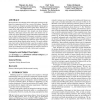Free Online Productivity Tools
i2Speak
i2Symbol
i2OCR
iTex2Img
iWeb2Print
iWeb2Shot
i2Type
iPdf2Split
iPdf2Merge
i2Bopomofo
i2Arabic
i2Style
i2Image
i2PDF
iLatex2Rtf
Sci2ools
106
click to vote
ATAL
2008
Springer
2008
Springer
Artificial agents learning human fairness
Recent advances in technology allow multi-agent systems to be deployed in cooperation with or as a service for humans. Typically, those systems are designed assuming individually rational agents, according to the principles of classical game theory. However, research in the field of behavioral economics has shown that humans are not purely self-interested: they strongly care about fairness. Therefore, multi-agent systems that fail to take fairness into account, may not be sufficiently aligned with human expectations and may not reach intended goals. In this paper, we present a computational model for achieving fairness in adaptive multi-agent systems. The model uses a combination of Continuous Action Learning Automata and the Homo Egualis utility function. The novel contribution of our work is that this function is used in an explicit, computational manner. We show that results obtained by agents using this model are compatible with experimental and analytical results on human fairnes...
ATAL 2008 | Behavioral Economics | Factors Keywords Fairness | Intelligent Agents | Multi-agent Systems |
Related Content
| Added | 12 Oct 2010 |
| Updated | 12 Oct 2010 |
| Type | Conference |
| Year | 2008 |
| Where | ATAL |
| Authors | Steven de Jong, Karl Tuyls, Katja Verbeeck |
Comments (0)

